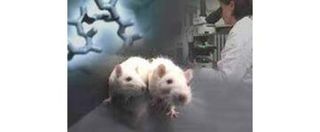Anti-Aging Prize Tops $1 Million

Maybe you can't put a price on death, but life certainly has its monetary rewards. And for scientists who can put mice on the road to immortality, the purse just reached $1 million.
The growing prize, offered by the Methuselah Foundation, is designed to stimulate anti-aging research with the ultimate goal of making us all live forever.
A cure for human aging, foundation members figure, will only come if more work is done on rodents.
Contributions rise
The Methuselah Mouse Prize, or M Prize as it is popularly known, offers awards to researchers who make significant advances in extending the lives of lab mice -- on the assumption that the work will lead eventually to extended human life. The organization offers two prizes. The Longevity Prize is for extending the life of a single mouse; the Rejuvenation Prize is for slowing aging in middle-aged mice.
Funds for the M Prize are solicited from individuals, including a growing group that have pledged to contribute $1,000 a year for the next 25 years. The latest contributor is William Haseltine, biotech pioneer of Human Genome Sciences, M Prize officials announced Tuesday.
The fund now stands at $1,006,187. Only $129,329 of that is in the organizations coffers, however, while the rest is in the "committed" column.
Sign up for the Live Science daily newsletter now
Get the world’s most fascinating discoveries delivered straight to your inbox.
"There's nothing to compare with this effort, and it has already contributed significantly to the awareness that regenerative medicine is a near term reality, not an if," Haseltine said in a statement.
The M Prize is modeled loosely after the popular Ansari X Prize that was awarded last year to the first private spacecraft to achieve suborbital flight. But there are significant differences.
A Longevity Prize will awarded whenever the record for the world's oldest mouse is beaten, with the cash doled out being related to the size of the fund at the time. Winning the Rejuvenation Prize requires advancements involving groups of mice.
((ImgTag||right|null|null|null|false)) Aubrey de Grey
The first Rejuvination Prize was awarded in December.
Eccentric origins
The non-profit Methuselah Foundation is the brainchild of eccentric researcher Aubrey de Grey, the organization's chairman. De Grey has never done laboratory research in biology. He's a computer scientist at the University of Cambridge who works with a team of geneticists. But a life-long interest in why people grow old has led him to a new specialty: biogerontology, the science of aging.
"If we are to bring about real regenerative therapies that will benefit not just future generations, but those of us who are alive today, we must encourage scientists to work on the problem of aging," de Grey said Tuesday.
De Grey believes there are exactly seven root causes of aging, all of which are reversible. Among the seven deadly, well, things, are cell atrophy, cell death, and unwanted mutations.
Methuselah was a patriarch in the Bible said to reach 969 years of age.
"It's not just better medical care, it's advances [in research] that will allow us to really slow down aging ... People have wanted it forever, and now here it is. Now that we have all these research tools, we can work on it seriously."
-- Steve Austad, Methuselah Foundation science advisor
Robert is an independent health and science journalist and writer based in Phoenix, Arizona. He is a former editor-in-chief of Live Science with over 20 years of experience as a reporter and editor. He has worked on websites such as Space.com and Tom's Guide, and is a contributor on Medium, covering how we age and how to optimize the mind and body through time. He has a journalism degree from Humboldt State University in California.

